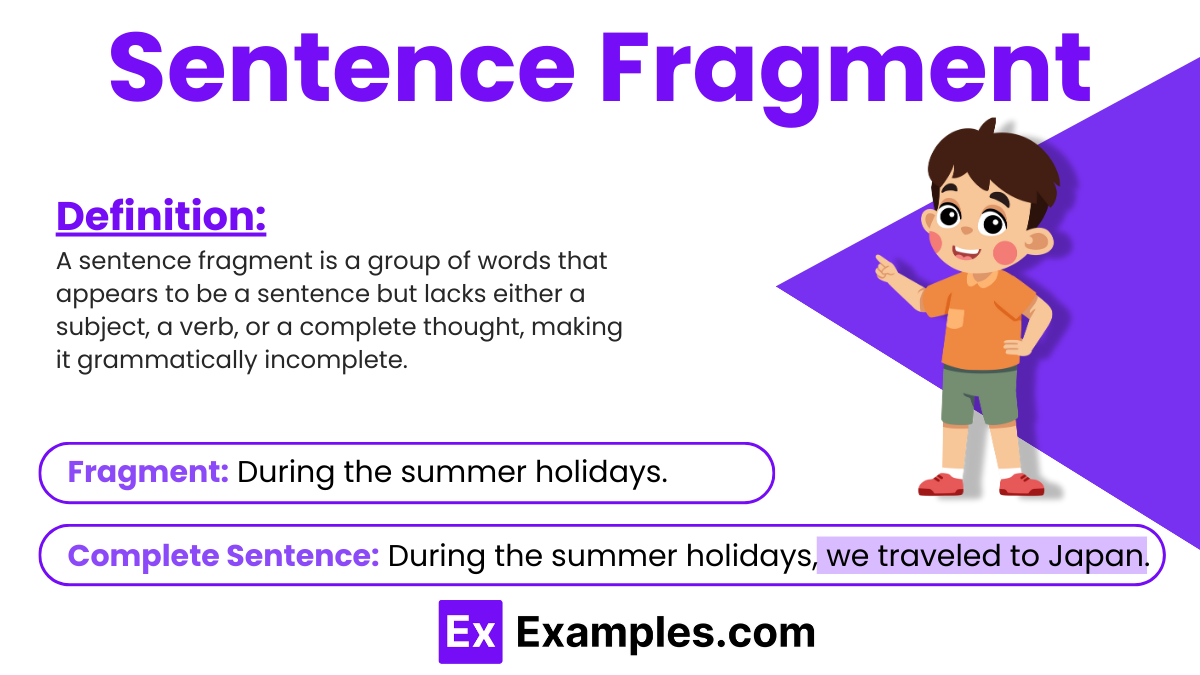140+ Sentence Fragment Examples
Dive deep into the world of sentence fragments with our detailed guide. From enlightening examples to hands-on exercises, we offer invaluable insights on identifying and rectifying these common writing pitfalls. Embrace our expert tips and transform fragmented sentences into polished, cohesive statements, enhancing readability and boosting your writing’s overall impact.
What is the Sentence Fragment? – Definition
A sentence fragment is a group of words that appears to be a sentence but lacks either a subject, a verb, or a complete thought, making it grammatically incomplete. While they often emerge in casual conversation or in specific writing styles, they can disrupt clarity in standard written English.
Types of Sentence Fragment
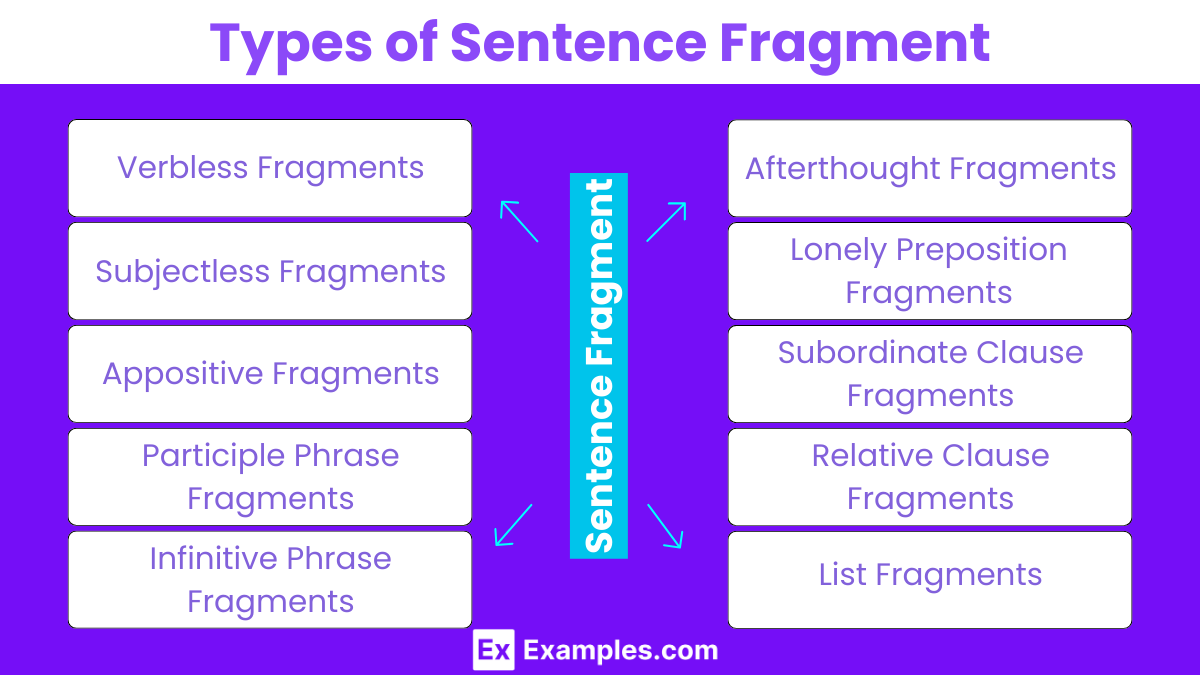
Sentence fragments are incomplete sentences that typically lack essential elements such as a subject, a verb, or a complete thought. Although often seen as errors in formal writing, they can be used deliberately for stylistic effect in more creative or informal contexts. Understanding the different types of sentence fragments can help you use them more effectively in your writing. Here are several common types:
1. Verbless Fragments
These fragments include a subject but lack a verb, making them incomplete.
Example:“The king of the jungle.” (Missing verb about what the king is doing)
2. Subjectless Fragments
These occur when the verb or action is present but the subject performing the action is missing.
Example:“Running through the fields.” (It’s unclear who is running)
3. Appositive Fragments
An appositive fragment renames a noun and is separated from the sentence, lacking the full structure needed to be complete.
Example:“A brilliant painter, known for his vibrant colors.” (The main clause that should follow is missing)
4. Participle Phrase Fragments
These fragments begin with a present or past participle but do not form a complete thought because they lack a main clause.
Example:“Walking along the beach, the sun setting behind her.” (Who was walking? Needs a main clause)
5. Infinitive Phrase Fragments
Fragments that start with an infinitive (to + verb) but do not provide a complete idea because they are not attached to a clause that can stand alone.
Example:“To win the championship.” (What about winning the championship? More information is needed)
6. Afterthought Fragments
These are incomplete thoughts added as an afterthought, often following a dash or ellipsis.
Example:“He was unstoppable – on the field, at least.”
7. Lonely Preposition Fragments
Fragments that consist of a prepositional phrase without a context or main clause.
Example:“Under the bed.” (What about under the bed?)
8. Subordinate Clause Fragments
These fragments contain a subordinate conjunction and provide additional information but depend on a main clause to complete the thought.
Example:“Although he had the right qualifications.” (What happened even though he had the qualifications?)
9. Relative Clause Fragments
These fragments begin with a relative pronoun (who, which, that) and describe something but do not have an independent clause to make a complete sentence.
Example:“Which we had planned to visit next summer.” (What about it?)
10. List Fragments
These are often used in bulleted or numbered lists or as part of a list in a sentence.
Example:“In the box: a hammer, some nails, a screwdriver.” (This could be seen as a fragment because it lacks a complete verb structure)
How to Fix Sentence Fragments? – Step by Step Guide
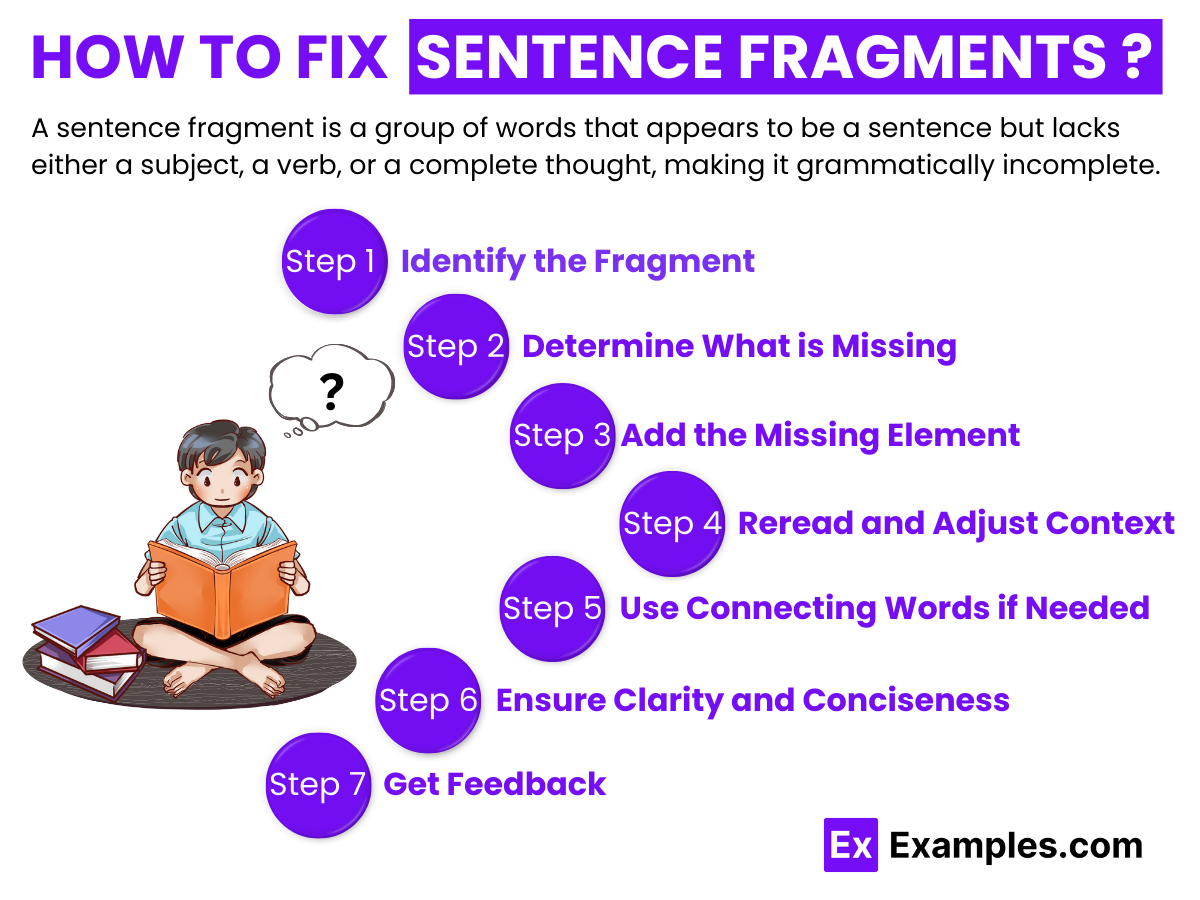
Fixing sentence fragments is crucial for improving clarity and coherence in writing, especially in formal and academic texts. Here’s a step-by-step guide to identifying and correcting sentence fragments:
Step 1: Identify the Fragment
First, determine whether a sentence is a fragment. A sentence fragment typically lacks one of the essential components of a complete sentence: a subject, a verb, or a complete thought.
- Subject Missing: “Running late for the train.”
- Verb Missing: “The king of comedy.”
- Incomplete Thought: “Because I was tired.”
Step 2: Determine What is Missing
Analyze the fragment to figure out what is missing. Is it the subject, the verb, or does the sentence not express a complete thought?
- Missing Subject: Who is doing the action?
- Missing Verb: What action is being performed?
- Incomplete Thought: Is there a dependent clause without an independent clause?
Step 3: Add the Missing Element
Depending on what is missing, add the necessary elements to make the sentence complete.
- For Missing Subject: Add a subject that performs the action.
Fragment: “Went to the store on Monday.”
Complete: “She went to the store on Monday.” - For Missing Verb: Insert a verb to convey action or being.
Fragment: “The teacher in the classroom.”
Complete: “The teacher is in the classroom.” - For Incomplete Thought: Attach the fragment to a main clause or revise it to stand alone.
Fragment: “Although she was tired.”
Complete: “She went to bed early although she was tired.”
Step 4: Reread and Adjust Context
Integrate the revised sentence into your paragraph or text. Read it aloud to ensure it flows well and fits the context. Adjust as necessary to maintain the intended meaning and style.
- Example Before: “He enjoys painting. Especially mountains.”
- Example After: “He enjoys painting, especially mountains.”
Step 5: Use Connecting Words if Needed
Sometimes, connecting the fragment to an existing sentence can resolve the issue. Use conjunctions, relative pronouns, or transitional phrases to merge ideas smoothly.
- Fragment: “Which was a big mistake.”
- Complete: “He decided to go alone, which was a big mistake.”
Step 6: Ensure Clarity and Conciseness
Verify that your sentence is not only complete but also clear and concise. Remove unnecessary words, and adjust the structure to improve readability and impact.
- Fragment: “During the long hours of the night and feeling sleepy.”
- Complete: “He felt sleepy during the long hours of the night.”
Step 7: Get Feedback
If possible, get feedback on your revised sentences. A second set of eyes can help catch any lingering issues and confirm that your sentences are complete and effective
Formula of Sentence Fragments with Examples
Missing Subject Fragments (Verb-based Fragments)
- Structure: [Verb] + [Optional Object/Complement]
- Example: “Running late.”
Missing Verb Fragments (Subject-based Fragments)
- Structure: [Subject or Object] + [Optional Modifier]
- Example: “The old haunted mansion.”
Subordinate Clause Fragments
- Structure: [Subordinate Conjunction] + [Subject] + [Verb]
- Example: “While we were sleeping.”
Infinitive Phrase Fragments
- Structure: “To” + [Base Form of the Verb] + [Optional Modifier/Object]
- Example: “To make a difference.”
Participle Phrase Fragments
- Structure: [Present Participle or Past Participle] + [Optional Modifier/Object]
- Example: “Considering all options.”
Appositive Fragments
- Structure: [Noun] + [Comma] + [Brief Explanation/Noun Phrase]
- Example: “A talented artist, a true master of colors.”
Usage Guidelines
To effectively use sentence fragments, keep these tips in mind:
- Context is Key: Use fragments when the surrounding text supports or explains the fragment. The context should make the fragment’s meaning clear without needing additional explanation.
- Purposeful Use: Employ fragments to achieve a specific effect such as highlighting a point, increasing tension, or emphasizing emotional content.
- Conciseness and Impact: Fragments can make your text more concise and impactful. They allow you to trim unnecessary words while focusing on key elements.
- Balance: While effective in moderation, overuse of fragments can make prose difficult to follow. Balance fragments with complete sentences to maintain clarity and reader engagement.
Examples in Context
- Dialogue: “What time?” he asked. “Around eight,” she replied.
- Descriptive Text: “The evening sky. Pink, orange, and purple. A painting come to life.”
- Narrative Tension: “A noise in the darkness. Footsteps. Closer. Closer still.”
Three Ways to Turn a Fragment into a Complete Sentence
1. Add the Missing Elements
Fragments often lack a subject, a verb, or both. Identify what is missing and add it to complete the thought.
Example:
- Fragment: During the summer holidays.
- Complete Sentence: During the summer holidays, we traveled to Japan.
Steps:
- Identify the missing elements. In this case, it’s the main verb and the subject performing the action.
- Add the necessary elements to complete the idea expressed by the fragment.
2. Attach to a Nearby Sentence
Sometimes a fragment is part of a thought that’s been incorrectly separated from a nearby sentence. You can often fix the fragment by attaching it to an adjacent sentence.
Example:
- Fragment: He gave her a gift. Wrapped in red paper.
- Complete Sentence: He gave her a gift wrapped in red paper.
Steps:
- Determine if the fragment is providing additional information about something in the adjacent sentence.
- Combine the fragment with the main sentence, ensuring it flows logically and grammatically.
3. Rearrange and Rewrite
If a fragment is awkward or unclear, sometimes rearranging its components or adding new ones can turn it into a complete sentence. This may involve rethinking the sentence structure or adding connecting words.
Example:
- Fragment: Under the table.
- Complete Sentence: The cat was hiding under the table.
Steps:
- Consider what the fragment is describing or referring to.
- Rewrite the fragment into a full sentence by rearranging its structure or adding necessary components to clarify the subject and action.
10+ Sentence Fragment Examples and Corrections
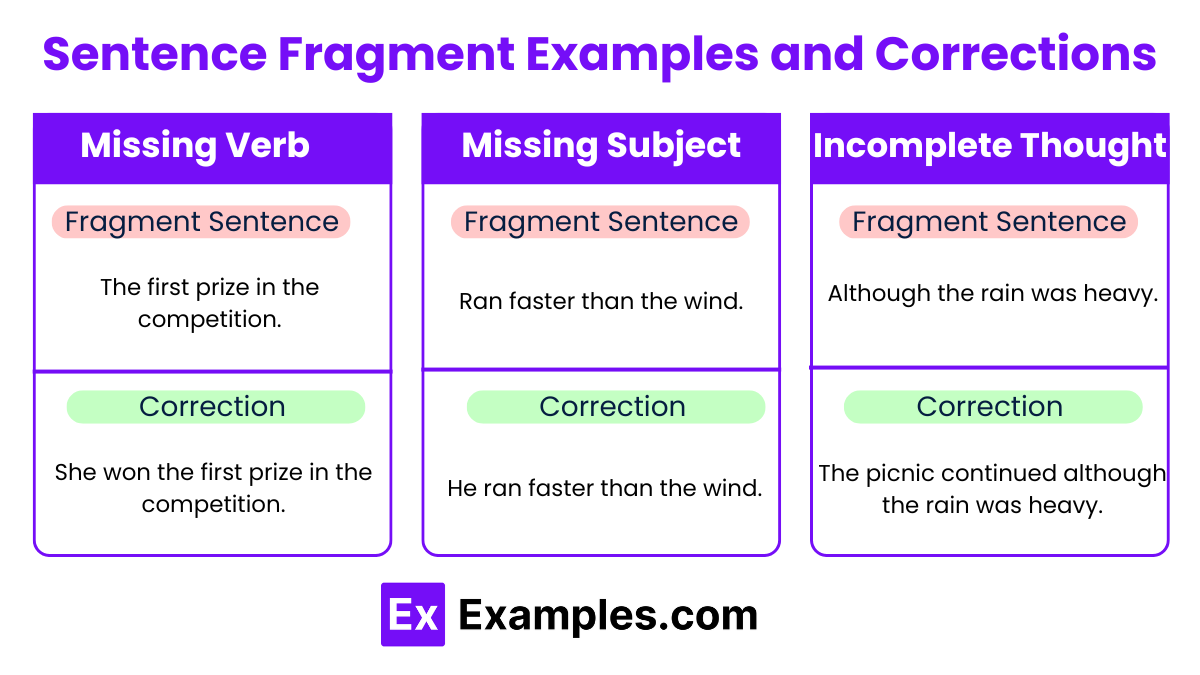
Missing Verb
Fragment: “The first prize in the competition.”
- Correction: “She won the first prize in the competition.”
Fragment: “A tall, shadowy figure in the corner.”
- Correction: “A tall, shadowy figure stood in the corner.”
Fragment: “Every book on the shelf.”
- Correction: “Every book on the shelf was dusty from neglect.”
Missing Subject
Fragment: “Ran faster than the wind.”
- Correction: “He ran faster than the wind.”
Fragment: “Are going to the market today.”
- Correction: “They are going to the market today.”
Fragment: “Will handle all your complaints within 24 hours.”
- Correction: “Our customer service department will handle all your complaints within 24 hours.”
Incomplete Thought
Fragment: “Because I said so.”
- Correction: “She did not go to the party because I said so.”
Fragment: “Although the rain was heavy.”
- Correction: “The picnic continued although the rain was heavy.”
Fragment: “When you decide to leave.”
- Correction: “Call me when you decide to leave.”
Fragment: “If the weather remains clear.”
- Correction: “We will go hiking if the weather remains clear.”
100+ Sentence Fragment Examples
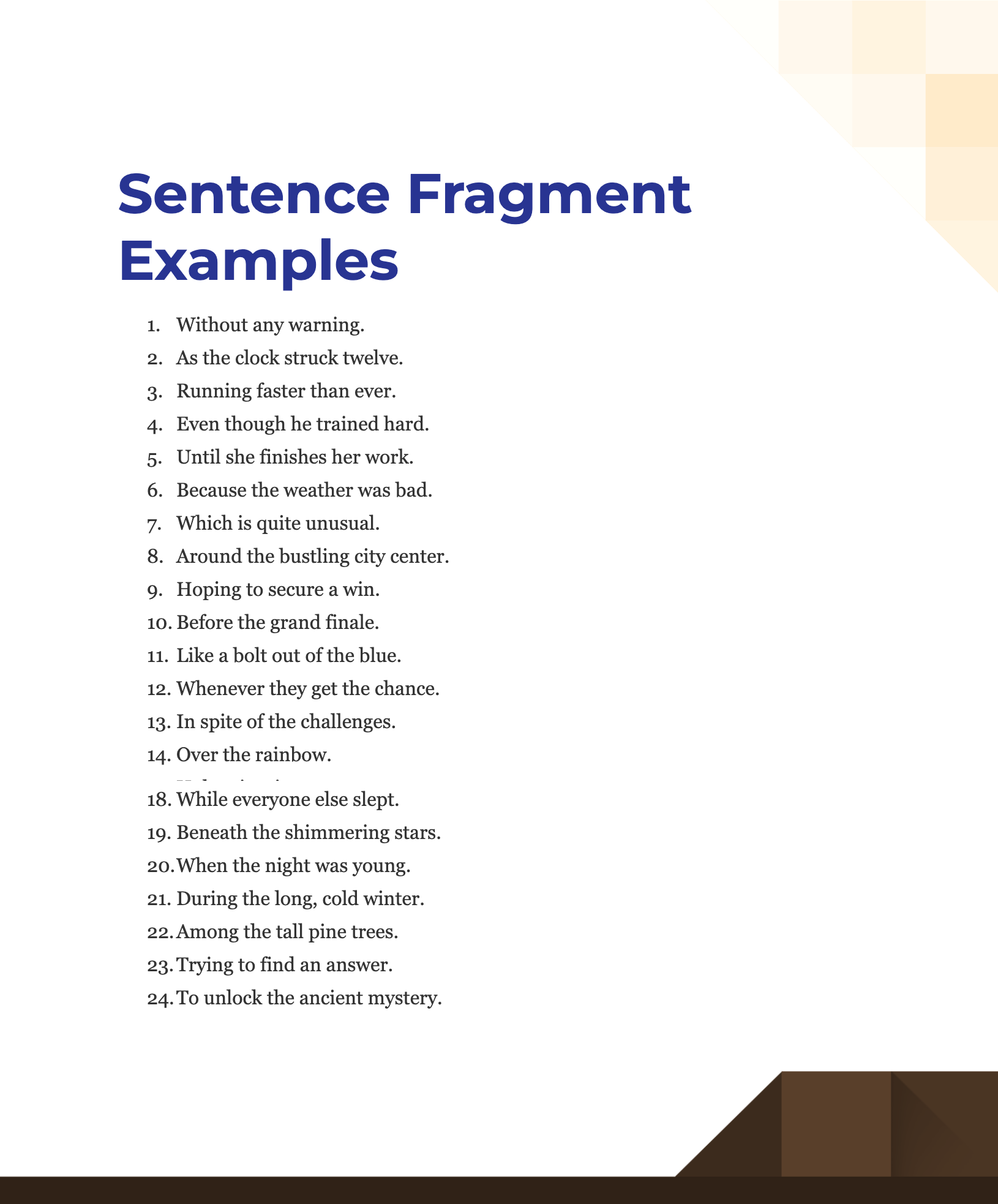
Sentence fragments, while often found in casual dialogues and certain writing styles, can pose challenges in more formal contexts. Mastering the art of identifying these incomplete sentences is pivotal for enhanced clarity and effective communication. Delve into our curated list of 100 unique sentence fragment examples to sharpen your grammatical acumen and elevate your writing finesse.
- Without any warning.
- As the clock struck twelve.
- Running faster than ever.
- Even though he trained hard.
- Until she finishes her work.
- Because the weather was bad.
- Which is quite unusual.
- Around the bustling city center.
- Hoping to secure a win.
- Before the grand finale.
- Like a bolt out of the blue.
- Whenever they get the chance.
- In spite of the challenges.
- Over the rainbow.
- Unless it rains.
- Since he arrived.
- Bright and early.
- While everyone else slept.
- Beneath the shimmering stars.
- When the night was young.
- During the long, cold winter.
- Among the tall pine trees.
- Trying to find an answer.
- To unlock the ancient mystery.
- Following the leader closely.
- Including all the essential items.
- Wishing upon a shooting star.
- After the intense workout.
- Although she was tired.
- Along the winding road.
- If you dare.
- Hiding behind the curtains.
- Eagerly awaiting the results.
- Beside the serene lake.
- Without a doubt.
- Inside the ornate box.
- Despite the odds.
- According to the plan.
- Bearing the weight of expectations.
- To capture the moment.
- As if nothing had happened.
- Below the water’s surface.
- Dreaming of a better future.
- On top of the world.
- Watching the world go by.
- For the love of art.
- Towards the setting sun.
- Except the kitchen.
- Reading the ancient manuscript.
- In case of an emergency.
- Crying over spilled milk.
- At the break of dawn.
- But they never came.
- Reaching for the stars.
- Against the backdrop of the city.
- Listening to the melodious song.
- From dawn till dusk.
- Laughing at the joke.
- Beyond the horizon.
- Forgetting all the worries.
- As per the instructions.
- With utmost care.
- Through thick and thin.
- With a heavy heart.
- Dancing with joy.
- Out of the ordinary.
- Singing in the rain.
- Thinking outside the box.
- Riding into the sunset.
- By the skin of one’s teeth.
- Without a care in the world.
- Chasing wild dreams.
- As smooth as silk.
- Under the weather.
- Except for one thing.
- Lost in thought.
- At a snail’s pace.
- Hungry for success.
- Between a rock and a hard place.
- Jumping for joy.
- Fishing for compliments.
- Dressed to the nines.
- In a jiffy.
- When push comes to shove.
- On cloud nine.
- As cool as a cucumber.
- Pulling strings behind the scenes.
- Biting off more than he can chew.
- At the drop of a hat.
- On the edge of their seats.
- Keeping an eye out.
- Until the cows come home.
- Throwing caution to the wind.
- Letting the cat out of the bag.
- Walking on thin ice.
- To have the last laugh.
- Without batting an eye.
- Drawing the line.
- Setting the record straight.
- With bells on.
Each fragment paints a vivid image or sentiment but lacks the elements that would make it a complete sentence, thereby showcasing the essence of sentence fragments.
How to Correct Fragments in your Writing
1. Fragment: “Under the bright, starry sky.”
Complete Sentence: “We sat together under the bright, starry sky, sharing stories.”
2. Fragment: “In the middle of a heated argument.”
Complete Sentence: “They found themselves in the middle of a heated argument, unable to agree.”
3. Fragment: “After the long, tiring journey.”
Complete Sentence: “They felt relieved after the long, tiring journey was finally over.”
4. Fragment: “Near the ancient, crumbling castle.”
Complete Sentence: “The treasure was hidden near the ancient, crumbling castle, waiting to be discovered.”
What are the Exercises for Sentence Fragments?
1. Fragment Identification
Objective: Identify whether the given sentences are complete or fragments.
Instructions:
- Read each sentence carefully.
- Decide if it is a complete sentence or a fragment.
- Explain why it is a fragment or a complete sentence.
Examples:
- “After the party ended.”
- “She enjoys walking through the park on sunny days.”
2. Correcting Fragments
Objective: Revise the fragments to make them complete sentences.
Instructions:
- Read each fragment.
- Add the necessary components (subject, verb, complete thought) to turn each fragment into a complete sentence.
Examples:
- “During the summer vacation.”
- Correction: “During the summer vacation, we visited several national parks.”
- “Running along the shoreline.”
- Correction: “She was running along the shoreline when the sun rose.”
3. Creating Fragments for Effect
Objective: Create sentence fragments to achieve a specific effect in a short paragraph.
Instructions:
- Write a short paragraph on a given topic.
- Intentionally use fragments to enhance style, create emphasis, or mimic spoken language.
- Explain the effect intended with each fragment.
Example Topic:
- Write a paragraph describing a tense moment in a game.
4. Combining and Expanding Fragments
Objective: Combine fragments to form a coherent and complete sentence.
Instructions:
- Given a list of fragments, combine them into one or more complete sentences.
- Ensure that the new sentences are grammatically correct and maintain logical coherence.
Examples:
- Fragments: “In the corner of the room.” “The old trunk.” “Sitting untouched for years.”
- Combined: “In the corner of the room, the old trunk was sitting untouched for years.”
5. Fragment Completion Challenge
Objective: Complete the fragment to express a full idea.
Instructions:
- You are provided with sentence fragments.
- Your task is to complete these fragments in a way that they express a full and coherent thought.
Examples:
- “Although she was prepared.”
- Completion: “Although she was prepared, the exam was still incredibly difficult.”
6. Dialogue Writing Using Fragments
Objective: Write dialogues using sentence fragments effectively.
Instructions:
- Create a short dialogue between two characters.
- Use sentence fragments where appropriate to mimic natural speech patterns.
Example:
- Character A: “What time is the meeting?”
- Character B: “Three o’clock. At the main office.”
How to Practice Sentence Fragments?
Fragment: “Ate all the cookies in the jar.”
- Issue: Who ate the cookies? The subject is missing.
- Complete Sentence: “She ate all the cookies in the jar.”
Fragment: “The quickly running deer through the forest.”
- Issue: What is being said about the deer? The main verb is missing.
- Complete Sentence: “The deer was quickly running through the forest.”
Fragment: “Including times of distress.”
- Issue: What does this modify or explain? It is unclear without a main clause.
- Complete Sentence: “He remains calm, including during times of distress.”
Fragment: “Even though she was late.”
- Issue: What happened as a result of her being late? The main clause is missing.
- Complete Sentence: “She still managed to catch the bus, even though she was late.”
Fragment: “For example, the flowers blooming in May.”
- Issue: What about the flowers blooming in May? The sentence lacks a main verb and context.
- Complete Sentence: “Many plants start to show their beauty in spring, for example, the flowers blooming in May.”
Fragment: “Smarter than.”
- Issue: Smarter than who or what? The comparison is incomplete.
- Complete Sentence: “He is smarter than she is.”
Fragment: “Under the old bridge.”
- Issue: What about under the old bridge? The context or action is missing.
- Complete Sentence: “They found a lost cat under the old bridge.”
Fragment: “To swim in the ocean during winter.”
- Issue: What is the intention or action related to this infinitive? It stands alone without context.
- Complete Sentence: “He dared to swim in the ocean during winter.”
Fragment: “Given the high stakes of the negotiation.”
- Issue: What happens as a result of the high stakes? It lacks a main clause.
- Complete Sentence: “Given the high stakes of the negotiation, they proceeded with exceptional caution.”
Tips for Using Sentence Fragments
- Understand the Rules: Know the basic rules of grammar and sentence structure before intentionally breaking them with fragments.
- Clarify Intent: Use fragments deliberately and ensure they serve a specific purpose in your text, such as creating emphasis or mimicking spoken language.
- Provide Context: Always use fragments within a context that makes their meaning clear. The surrounding sentences should support and explain the fragment.
- Keep It Relevant: Ensure the fragment is relevant to the topic and contributes meaningfully to your message.
- Use Sparingly: Overuse of fragments can make your writing choppy and difficult to follow. Balance fragments with complete sentences.
- Enhance Style and Tone: Match the use of fragments with the style and tone of your piece. They are more suitable in informal, conversational, or creative texts.
- Aim for Impact: Deploy fragments to enhance the impact of your writing, such as highlighting a point, increasing suspense, or emphasizing a narrative moment.
- Ensure Readability: Read your text aloud to check if the fragment fits smoothly and enhances the reading experience without causing confusion.
- Revise for Clarity: Be prepared to revise or extend a fragment into a complete sentence if it creates ambiguity or disrupts the flow of your writing.
- Seek Feedback: Get feedback from others on your use of fragments. If readers find them confusing or jarring, consider revising your approach
FAQ’s
Which Sentence Contains a Fragment?
A sentence that contains a fragment will lack a main verb, subject, or complete thought. For example, in the pair “She enjoys painting. Especially landscapes.”, the second sentence is a fragment.
What is an Example of an Incomplete Sentence?
An example of an incomplete sentence is “While walking to school.” This sentence is a fragment because it sets up a condition but does not complete the thought.
What is the Difference Between a Phrase and a Fragment?
A phrase is a group of words that acts as a single part of speech but does not contain a subject and verb, whereas a fragment also lacks a full subject and verb but is intended to be a sentence.
What are 5 Examples of Complete Sentences?
“The dog barked loudly.”
“She runs every morning.”
“He quickly read the book.”
“They laughed at the joke.”
“We are going to the park tomorrow.”
What is an Example of a Fragment Incomplete Sentence?
An example of a fragment incomplete sentence is “During the marathon.” This fragment implies more information that is not provided, such as what occurred during the marathon.
What is an Example of a Complete and Incomplete Sentence?
A complete sentence: “She enjoys swimming in the ocean.” An incomplete sentence: “During the hot summer days.” The first is a complete thought with a subject and verb, while the second lacks a main clause.


